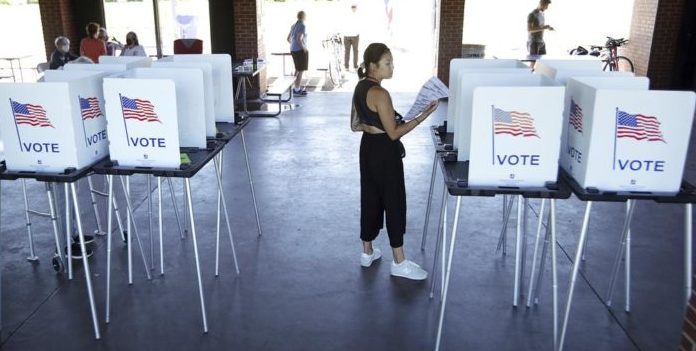(Mark Pellin, Headline USA) As a desperate Liz Cheney, RINO-Wyo., scrambles to avoid a total rout in her primary by actively encouraging Democrats to switch parties to vote for her, Republican leaders who have noticed other turncoat candidates attempting the same ploy are taking pro-active measures to stop the saboteur meddling.
After Idaho’s primary election was subverted earlier this year by so-called “crossover” voting, which likely helped defeat at least one pro-MAGA candidate, the state’s GOP convention committee in July approved new rules that would disqualify voters affiliated with other parties from registering as Republicans to vote in the party’s primary elections, reported the Idaho Capitol Sun.
In the deep-red state, victories in Idaho’s primaries are near guarantees of winning election to office. The state’s GOP in 2012 closed its primary process to allow only Republicans to vote for the candidates they want to advance a general election.
That hasn’t stopped leftists from meddling. Increasingly, Democrats who would otherwise have no chance in a general election are encouraging, begging or otherwise convincing fellow Democrats to register as Republicans and vote for the more squishy, establishment RINO candidate who would be likely to fold on issues like abortion, gun control and promoting leftist dogma in schools.
The Idaho GOP’s new rules, which convention delegates overwhelmingly passed, will go into effect if approved in January by the state central committee and ultimately by the state legislature.
Under the new rules, GOP central committees can determine the political affiliation of people who file or intend to file as candidates for the Republican Party. The rules would also disqualify certain voters from registering with the Idaho Republican Party and participating in primary elections.
Those restrictions would apply to anyone who hadn’t affiliated as a Republican at least 12 months in advance from voting in a primary; disaffiliated with the GOP at any time in the preceding 39 months of a primary; financially supported more than one candidate of a different political party for office less than 25 months before a primary; or voted in a primary or caucus for any other political party less than 25 months before the primary, according to the Idaho State Journal.
The proposed rule changes, ironically, were drafted by Branden Durst, a former Democrat legislator who ran losing campaigns in 2016 and 2018, joined the Republican party in 2020 and ran unsuccessfully as a Republican candidate for superintendent of public instruction in the May primary. He attributed the loss, in large part, to crossover voting, reported the Bonner County Daily Bee.
Democrats, concerned that the new rules would scuttle their crossover schemes, blasted them as a threat to fair elections. Durst dismissed the hysteria being created by the same crowd that critics charge are subverting elections.
“They want to come into our party. They want to pick our quarterback,” Durst said. “This is an opportunity to nominate people to represent this party, which is the most sacred thing this party does.”
Cross-over voting isn’t unique to Idaho, as Democrats are looking to sabotage Republican primaries in various battleground states across the country. The consequences can be game-changing.
In Georgia, where state law allows voters to participate in either party’s primary regardless of affiliation, Democrats openly boasted earlier this year about how their crossover votes helped Trump nemesis Secretary of State Brad Raffensperger survive a GOP primary challenge.
An analysis of voting records by the Associated Press showed that upwards of 37,000 Democrats likely cast crossover ballots in the Republican primary, a large enough number to help deliver a win for Raffensperger, who cleared the 50% run-off threshold by about 27,000 votes.
“I feel strongly that our democracy is at risk,” said one lifelong Democrat, apparently so concerned about preserving election integrity that she was willing to subvert it by pretending to be a Republican.
“I don’t know I’ll do it again because of how I felt afterward,” the voter said. “I just felt icky.”
She didn’t elaborate whether the “icky” was caused by voting for a Republican or trying to subvert election integrity.

